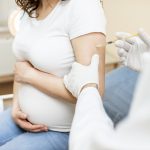BREAKING: Johnson & Johnson targets newborns, infants, and pregnant women next for COVID vaccine trials
 (NaturalHealth365) On February 26, 2021, the pharmaceutical company and COVID vaccine maker Johnson and Johnson (of Janssen Biotech, Inc.) held an advisory committee briefing with their sponsors. In the briefing (page 34), they outlined their plans to test their investigational viral vector vaccine, Ad26.COV2.S, in an upcoming cohort of participants.
(NaturalHealth365) On February 26, 2021, the pharmaceutical company and COVID vaccine maker Johnson and Johnson (of Janssen Biotech, Inc.) held an advisory committee briefing with their sponsors. In the briefing (page 34), they outlined their plans to test their investigational viral vector vaccine, Ad26.COV2.S, in an upcoming cohort of participants.
But while many in the mainstream media are applauding these “fast-tracked” vaccination trials, many question the safety and necessity of testing a brand-new vaccine in populations as vulnerable as newborn infants.
Johnson & Johnson preparing to trial its genetically engineered, investigational vaccine on adolescents, newborns and pregnant moms
The U.S. Centers for Disease Control and Prevention (CDC) recently authorized Johnson & Johnson to offer its COVID vaccine to adults aged 18 and older in the United States. On the heels of their clinical trials, Johnson & Johnson is now quickly turning their investigative aims toward yet untested populations much more quickly than their pharmaceutical counterparts are.
While Pfizer-BioNTech and Moderna plan to study the effects of their experimental drugs on younger kids in a more gradual manner, Johnson & Johnson appears to be going full-steam ahead. First, they’ll be testing their vaccine on children between the ages of 12 and 18 years old, and immediately thereafter in newborns and adolescents. Next up in their vaccine trials will be pregnant women and their infants, and finally will be immunocompromised individuals.
Mainstream media and public health officials are celebrating this move, calling for the need for more data on these special populations. However, children and infants appear to be extremely unlikely to suffer serious illness from COVID-19 and are thought to be less likely to catch or spread the virus. One October 2020 report by the American Academy of Pediatrics concluded that children make up just 13 percent of all COVID-19 cases, and the CDC recently stated in a February 2021 release that “in-person learning in schools has not been associated with substantial community transmission.”
For these reasons and more, many parents and providers are wary of testing unapproved, investigational drugs on kids.
It should be noted that testing a COVID vaccine in a newborn infant or even young child is likely to go on in tandem with the normal childhood vaccination schedule, which is already astronomical by historical standards. As outlined by the Children’s Health Defense, the 1986 childhood vaccine schedule featured just 12 jabs against 8 diseases. Today’s vaccination schedule boasts 54 shots against 16 diseases … 17, potentially, if a COVID-19 vaccination is added to the mandatory list.
Johnson & Johnson jab different from other COVID vaccines – here’s how
The Pfizer-BioNTech and Moderna vaccines that are currently authorized for emergency use are based on new mRNA technology and require (at least) 2 doses. The Johnson and Johnson drug is a viral vector vaccine and requires only one dose, for the time being anyway.
This vaccine is made with a disabled adenovirus (similar to viruses that cause the common cold) that has been engineered to enter human cells. Once inside, the tampered virus delivers genetic instructions that force these cells to create copies of the characteristic spike proteins found on the surface of the virus that causes COVID-19, SARS-CoV-2. Once these spike proteins have been made, the vaccine recipient’s immune system is supposed to trigger a powerful response and create antibodies that are believed to protect the person against SARS-CoV-2 in the future.
Notably, viral vector vaccines typically require the use of unusual adenoviruses not commonly exposed to humans, such as those found in chimpanzees, in order to promote a strong immune response.
According to the CDC, current clinical trials on the Johnson & Johnson jab reveal that the vaccine is roughly 66 percent effective at preventing COVID-19. This is barely any better than the seasonal flu vaccine, which the CDC says boasts an efficacy rate of anywhere from 40 to 60 percent.
At the moment, no COVID vaccine has been licensed nor approved by the FDA. Stay tuned, as we at NaturalHealth365 continue to closely monitor this situation. Let us know how you feel about this issue.
Sources for this article include:
NYTimes.com
Nature.com
Yahoo.com
FDA.gov
Childrenshealthdefense.org
Statnews.com
ACS.org
FDA.gov
Harvard.edu
Hopkinsmedicine.org
AAP.org



